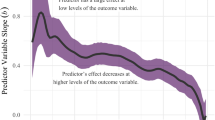Abstract
Subjects made predictions of the grade point averages of hypothetical students who varied over complete continua of scholastic ability and effort. Subjects in Study 1 made their predictions on the implicit assumption that target students were drawn from a student body chosen via selective admissions criteria. Study 2 subjects assumed that the ability range was one resulting from a “first-come, first-served” open-admissions policy. Although the ability assumption inductions, as intended, led to performance level predictions that were differently dispersed, the basic patterns of subjects' predictions were essentially the same in both studies: For the overwhelming majority of subjects, ability and effort were perceived to affect scholastic performance additively rather than multiplicatively, thus contradicting the suggestions of previous theory. In addition, students with high ability were anticipated to perform reasonably well even when exerting practically no effort. Theoretical interpretations and practical implications of these results are introduced and discussed.
Similar content being viewed by others
References
Anderson, N. H. Algebraic models for information integration.Technical Report No.CHIP 45 Center for Human Information Processing, University of California, San Diego, June 1974. (a)
Anderson, N. H. Cognitive algebra: Integration theory applied to social attribution. In L. Berkowitz (Ed.),Advances in experimental social psychology. New York: Academic Press, 1974. Pp. 1–101. (b)
Anderson, N. H., & Butzin, C. A. Performance = motivation × ability.Journal of Personality and Social Psychology 1974,30 598–604.
Heider, F.The psychology of interpersonal relations. New York: Wiley, 1958.
Kahneman, D.Attention and effort. Englewood Cliffs, New Jersey: Prentice-Hall, 1973.
Korman, A. K.The psychology of motivation. Englewood Cliffs, New Jersey: Prentice-Hall, 1974.
Lawler, E. E.Motivation in work organizations. Monterey, California: Brooks/Cole, 1973.
Nicholls, J. G. Effort is virtuous, but it's better to have ability: Evaluative responses to perceptions of effort and ability.Journal of Research in Personality 1976,10 306–315.
Nisbett, R. E., & Wilson, T. D. Telling more than we can know: Verbal reports on mental processes.Psychological Review 1977,84 231–259.
Vroom, V. H.Work and motivation. New York: Wiley, 1964.
Weiner, B.Theories of motivation. Chicago: Markham, 1972.
Weiner, B. (Ed.).Cognitive views of human motivation. New York: Academic Press, 1974.
Weiner, B., & Kukla, A. An attributional analysis of achievement motivation.Journal of Personality and Social Psychology 1970,15 1–20.
Yates, J. F., & Kulick, R. M. Effort control and judgments.Organizational Behavior and Human Performance 1977,20 54–65.
Author information
Authors and Affiliations
Additional information
This research was supported by Grant MH 27000 from the National Institute of Mental Health. It is a pleasure to acknowledge the capable assistance of Philip Johnson in the running of subjects and analysis of data for the reported studies.
Rights and permissions
About this article
Cite this article
Yates, J.F., Jagacinski, C.M. & Taubman, A.J. Academic performance as a perceived function of ability and effort. Motiv Emot 3, 171–182 (1979). https://doi.org/10.1007/BF01650602
Issue Date:
DOI: https://doi.org/10.1007/BF01650602




